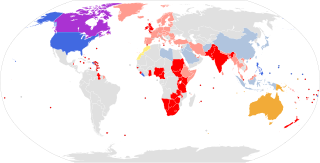
A dictionary is a listing of lexemes from the lexicon of one or more specific languages, often arranged alphabetically, which may include information on definitions, usage, etymologies, pronunciations, translation, etc. It is a lexicographical reference that shows inter-relationships among the data.
A simile is a figure of speech that directly compares two things. Similes differ from metaphors by highlighting the similarities between two things using comparison words such as "like", "as", "so", or "than", while metaphors create an implicit comparison. This distinction is evident in the etymology of the words: simile derives from the Latin word similis, while metaphor derives from the Greek word metapherein. As in the case of metaphors, the thing that is being compared is called the tenor, and the thing it is being compared to is called the vehicle. Author and lexicographer Frank J. Wilstach compiled a dictionary of similes in 1916, with a second edition in 1924.
A thesaurus, sometimes called a synonym dictionary or dictionary of synonyms, is a reference work which arranges words by their meanings, sometimes as a hierarchy of broader and narrower terms, sometimes simply as lists of synonyms and antonyms. They are often used by writers to help find the best word to express an idea:
...to find the word, or words, by which [an] idea may be most fitly and aptly expressed
Literal and figurative language is a distinction within some fields of language analysis, in particular stylistics, rhetoric, and semantics.
A monolingual learner's dictionary (MLD) is designed to meet the reference needs of people learning a foreign language. MLDs are based on the premise that language-learners should progress from a bilingual dictionary to a monolingual one as they become more proficient in their target language, but that general-purpose dictionaries are inappropriate for their needs. Dictionaries for learners include information on grammar, usage, common errors, collocation, and pragmatics, which is largely missing from standard dictionaries, because native speakers tend to know these aspects of language intuitively. And while the definitions in standard dictionaries are often written in difficult language, those in an MLD use a simple and accessible defining vocabulary.

The word orange is a noun and an adjective in the English language. In both cases, it refers primarily to the orange fruit and the color orange, but has many other derivative meanings.
The word(s) of the year, sometimes capitalized as "Word(s) of the Year" and abbreviated "WOTY", refers to any of various assessments as to the most important word(s) or expression(s) in the public sphere during a specific year.

Despite the various English dialects spoken from country to country and within different regions of the same country, there are only slight regional variations in English orthography, the two most notable variations being British and American spelling. Many of the differences between American and British/Commonwealth English date back to a time before spelling standards were developed. For instance, some spellings seen as "American" today were once commonly used in Britain, and some spellings seen as "British" were once commonly used in the United States.
Differences in pronunciation between American English (AmE) and British English (BrE) can be divided into
A bogle, boggle, or bogill is a Northumbrian and Scots term for a ghost or folkloric being, used for a variety of related folkloric creatures including Shellycoats, Barghests, Brags, the Hedley Kow and even giants such as those associated with Cobb's Causeway. They are reputed to live for the simple purpose of perplexing mankind, rather than seriously harming or serving them.

The chairperson, also chairman, chairwoman or chair, is the presiding officer of an organized group such as a board, committee, or deliberative assembly. The person holding the office, who is typically elected or appointed by members of the group or organisation, presides over meetings of the group, and conducts the group's business in an orderly fashion.
A pronunciation respelling for English is a notation used to convey the pronunciation of words in the English language, which do not have a phonemic orthography.

The advanced learner's dictionary is the most common type of monolingual learner's dictionary, that is, a dictionary written in one language only, for someone who is learning a foreign language. It differs from a bilingual or translation dictionary, a standard dictionary written for native speakers, or a children's dictionary. Its definitions are usually built on a restricted defining vocabulary. "Advanced" usually refers learners with a proficiency level of B2 or above according to the Common European Framework. Basic learner's dictionaries also exist.
Merriam-Webster's Dictionary of English Usage (MWDEU) is a usage dictionary published by Merriam-Webster, Inc., of Springfield, Massachusetts. It is currently available in a reprint edition (1994) ISBN 0-87779-132-5 or ISBN 978-0-87779-132-4.

Fewer versus less is a debate in English grammar about the appropriate use of these two determiners. Linguistic prescriptivists usually say that fewer and not less should be used with count nouns, and that less should be used only with mass nouns. This distinction was first tentatively suggested by the grammarian Robert Baker in 1770, and it was eventually presented as a rule by many grammarians since then. However, modern linguistics has shown that idiomatic past and current usage consists of the word less with both count nouns and mass nouns so that the traditional rule for the use of the word fewer stands, but not the traditional rule for the use of the word less. As Merriam-Webster's Dictionary of English Usage explains, "Less refers to quantity or amount among things that are measured and to number among things that are counted.”





